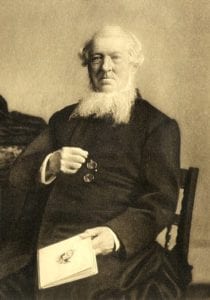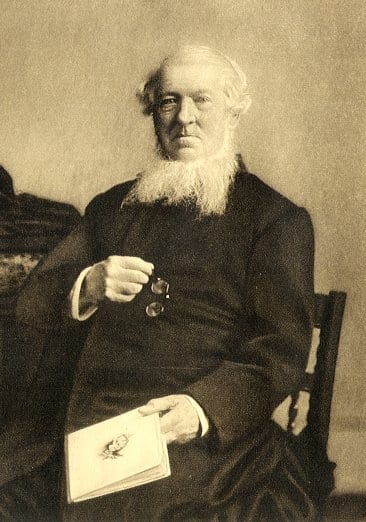 Christianity—including therein the dispensation of the Old Testament, which was its first stage—is in nothing more distinguished from the other religions of the world than in its objective or historical character. The religions of Greece and Rome, of Egypt, India, Persia, and the East generally, were speculative systems, which did not even seriously postulate an historical basis. If they seemed to do so to some extent, if for instance the mythological ideas of the Greeks be represented under the form of a mythological period, which moreover blends gradually and almost imperceptibly with the historical, still in the minds of the Greeks themselves the periods were separate and distinct, not merely in time, but in character; and the objective reality of the scenes and events described as belonging to each was not conceived of as parallel, or even similar, in the two cases. The modern distinction between the legend and the myth, properly so called, was felt, if not formally recognized, by the Greek mind; and the basis of fact, which is of the essence of the former, was regarded as absent from the latter, which thus ceased altogether to be history. Mahometanism again, and the other religious systems which have started with an individual, and which so far bear a nearer resemblance to the religions of Moses and of Christ, than those that have grown up and been developed gradually out of the feeling and imagination of a people, are very slightly, if at all, connected with any body of important facts, the due attestation of which and their accordance with other known facts might be made the subject of critical examination. We may concede the truth of the whole story of Mahomet, as it was related by his early followers, and this concession in no sort carries with it even the probable truth of the religion. But it is otherwise with the religion of the Bible. There, whether we look to the Old or the New Testament, to the Jewish dispensation or to the Christian, we find a scheme of doctrine which is bound up with facts; which depends absolutely upon them; which is null and void without them; and which may be regarded as for all practical purposes established if they are shown to deserve acceptance.
Christianity—including therein the dispensation of the Old Testament, which was its first stage—is in nothing more distinguished from the other religions of the world than in its objective or historical character. The religions of Greece and Rome, of Egypt, India, Persia, and the East generally, were speculative systems, which did not even seriously postulate an historical basis. If they seemed to do so to some extent, if for instance the mythological ideas of the Greeks be represented under the form of a mythological period, which moreover blends gradually and almost imperceptibly with the historical, still in the minds of the Greeks themselves the periods were separate and distinct, not merely in time, but in character; and the objective reality of the scenes and events described as belonging to each was not conceived of as parallel, or even similar, in the two cases. The modern distinction between the legend and the myth, properly so called, was felt, if not formally recognized, by the Greek mind; and the basis of fact, which is of the essence of the former, was regarded as absent from the latter, which thus ceased altogether to be history. Mahometanism again, and the other religious systems which have started with an individual, and which so far bear a nearer resemblance to the religions of Moses and of Christ, than those that have grown up and been developed gradually out of the feeling and imagination of a people, are very slightly, if at all, connected with any body of important facts, the due attestation of which and their accordance with other known facts might be made the subject of critical examination. We may concede the truth of the whole story of Mahomet, as it was related by his early followers, and this concession in no sort carries with it even the probable truth of the religion. But it is otherwise with the religion of the Bible. There, whether we look to the Old or the New Testament, to the Jewish dispensation or to the Christian, we find a scheme of doctrine which is bound up with facts; which depends absolutely upon them; which is null and void without them; and which may be regarded as for all practical purposes established if they are shown to deserve acceptance.
It is this peculiar feature of Christianity—a feature often noticed by its apologists—which brings it into such a close relation to historical studies and investigations. As a religion of fact, and not merely of opinion,—as one whose chief scene is this world, and whose main doctrines are events exhibited openly before the eyes of men—as one moreover which, instead of affecting a dogmatic form, adopts from first to last, with very rare exceptions, the historical shape, it comes necessarily within the sphere of the historical inquirer, and challenges him to investigate it according to what he regards as the principles of his science. Moreover, as Christianity is in point of fact connected intimately with certain records, and as those records extend over a period of several thousands of years, and “profess to contain a kind of abridgment of the history of the world,” its points of contact with profane history are (practically speaking) infinite; and it becomes impossible for the historical inquirer to avoid the question, in what light he is to view the documents which, if authentic, must exercise so important an influence over his studies and conclusions.
Christianity then cannot complain if, from time to time, as historical science, advances, the question is raised afresh concerning the real character of those events which form its basis, and the real value of those documents on which it relies. As an historical religion, it invites this species of inquiry, and is glad that it should be made and repeated. It only complains in one of two cases—when either principles unsound and wrong in themselves, having been assumed as proper criteria of historic truth, are applied to it for the purpose of disparagement; or when, right principles being assumed, the application of them, of which it is the object, is unfair and illegitimate.
George Rawlinson, The Historical Evidences of the Truth of the Scripture Records (Boston: Gould and Lincoln, 1860), pp. 25-27.



